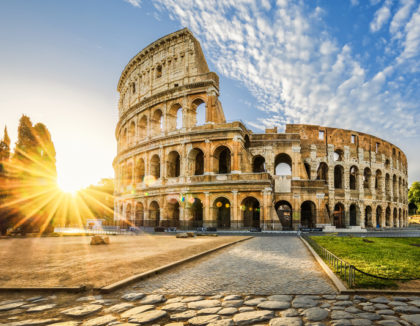National Information on Italy – Apulia
Comparison of temperatures
| Jan | Feb | Mar | Apr | May | Jun | Jul | Aug | Sep | Oct | Nov | Dec |
| Rome | 11 | 13 | 17 | 18 | 23 | 27 | 29 | 29 | 26 | 20 | 17 | 13 |
| London | 8 | 8 | 11 | 15 | 18 | 20 | 22 | 22 | 19 | 17 | 12 | 8 |
General note:
Below is an information overview. The conditions of entry, as well as the political and health situation, can change anywhere in the world at any time. We therefore recommend checking before your trip. Please check the website of the Foreign Office (www.gov.uk/) before your departure.
Form of government:
Republic, parliamentary democracy with bicameral system. President Sergio Mattarella has been the head of state since February 2015. Minister President Mario Draghi has been the head of government since February 2021.
Area:
301,277 square kilometres.
Capital:
Rome has been the capital of Italy since 1871 and has 2.9 million inhabitants.
Religion:
Primarily Roman Catholic, plus approx. 1.3 million Muslims, around 550,000 Protestants, 230,000 Jehovah Witnesses, 200,000 Buddhists, 110,000 Hindus and 40,000 Jews.
Language:
The national language is Italian. Friulian, Ladin, German, Slovenian, Occitan, French, Franco-Provencal, Albanian, Greek, Sardinian, Catalan and Croatian are also officially recognised minority languages.
Climate:
In Italy, the climate varies significantly between the north and south. The north is governed by a harsh climate with very cold winters and very hot summers with high levels of humidity. In the centre, the climate is moderate while winters are always mild and summers very warm and sultry in the south and on the islands.
Electricity:
Electricity in Italy is supplied at a voltage of 230 V and in the form of alternating current with a frequency of 50 Hertz. Power outlets comply with European guidelines. You need an adapter in your hotel.
Local time:
Italy is part of the Central European Time zone where GMT+1 applies, along with daylight saving time.
Making Phone calls:
To call an Italian phone number from abroad: international dialling code for Italy (+39), followed by the respective phone number. To make phone calls to the UK: pre-dial 0044 (+44).
Entry requirements for British citizens:
If you are planning to travel to an EU country you must meet the Schengen area rules. Your passport must meet 2 requirements. It must be:
– less than 10 years old on the day you enter (check the ‘date of issue’)
– valid for at least 3 months after the day you plan to leave (check the ‘expiry date’)
You can travel to countries in the Schengen area for up to 90 days in any 180-day period without a visa. Check your passport is stamped if you enter or exit the Schengen area through Italy as a visitor. Border guards will use passport stamps to check you’re complying with the 90-day visa-free limit for short stays in the Schengen area. If relevant entry or exit stamps are not in your passport, border guards will presume that you have overstayed your visa-free limit. Nationals of other countries are advised to enquire at the Italian Embassy about the entry requirements applicable to them. Customers are reminded that it is their sole responsibility to make sure that passport and visa entry requirements for the country or countries that they are visiting are satisfied and we can not be responsible for any problems encountered (whether at any point of entry or elsewhere) in the event that passport and visa requirements are not satisfied. Regulations in respect of passport and visa requirements for Italy are the responsibility of the Ministry of Foreign Affairs and International Cooperation whose Website is https://www.esteri.it/en/. If you hold a different type of British nationality (BN(O), British Overseas Citizen, British Protected Person or British Subject), check visa requirements with the Italian Embassy before you travel. However, passport and visa requirements change from time to time and are also dependent on the purpose of your visit and your nationality. Whilst we endeavour to provide guidance where necessary. For up-to-date information on entry requirements, please visit https://www.gov.uk/foreign-travel-advice/.
Tour guide:
Your tour guides will be able to provide you with detailed information on the country, people, history, culture etc., and offer advice and assistance in organising your trip. They can also help with room allocation and look forward to welcoming you with initial information. Here you will find out all you need to know and useful information about the trip. We have put together a varied programme including numerous highlights, enabling you to experience the culture and diversity of landscape that Italy has to offer, and learn all about the country and its people.
Additional packages:
Although your trip already includes a comprehensive package, you also have the option of choosing added extras. We recommend booking the following packages:
Explorer package: the package includes the two exclusive full day excursions „Castel del Monte (UNESCO World Heritage), Andria & Trani“ and „Polignano a Mare & Monopoli“: only £139* per person.
Food package: The package includes 7 × evening meals (3-course menu with dishes typical of the region): only £129 per person.
* Package prices may vary when booking on site.
Currency:
The currency is the Euro. Exchange rate (as at May 2022): 1 GBP = 1.19 EUR; 1 EUR = 0.84 GBP.
Banks/Credit cards:
Purchases can be paid for in cash and using the most popular credit cards. This payment system is typical in Italian shops; the symbols of credit cards accepted are usually displayed at the entrance to shops. ID cards are required when paying by credit card. Travellers’ cheques (in dollars or Euro) can also be cashed in banks. It is also possible to withdraw cash from ATMs using EC/Maestro cards but high fees may be charged by the respective bank. Cash payments exceeding 3,000 EUR (2700 GBP) are not possible in Italy. Sums exceeding 3,000 EUR can only be paid for by credit card, EC card or by bank transfer.
City tax: A state city tax of between €1.00 (approx. £ 0,85) and €3.50 (approx. £ 3) per person/night must be paid on site (last revised: March 2022)..
Customs regulations:
Sums exceeding €10,000 must be declared when entering or leaving Italy. Private persons travelling within the EU can purchase and export goods without limits on quantities if they are for personal use and not intended for resale. Further customs information regarding the import of goods can be obtained from the embassy of your destination country. This is the only place from which to obtain legally correct and binding information.
Important: If you’re travelling to Great Britain from outside the UK, your personal allowances mean you can bring in a certain amount of goods without paying tax or duty. If you go over your allowances you must declare all your goods and pay tax and duty on all the goods in that category. Please inform yourself about the current customs regulations: www.gov.uk/bringing-goods-into-uk-personal-use/arriving-in-Great-Britain.
Safety instructions:
Crime: Vigilance should be exercised regarding pickpockets and petty crime in tourist centres in particular, especially cases of fraud where tourists are distracted (e.g. by jostling etc.) and then stolen from by accomplices. As for any holiday trip, the rule is to only ever carry what is absolutely necessary. Large amounts of cash and original identification documents should always be deposited in the hotel safe. If necessary, only carry secure credit cards (protected by PIN) on your person. Take photocopies of your documents with you when you travel. Alternatively, you can save the files on a private e-mail account, enabling them to be accessed wherever you are in the world. When walking outside, do not wear bags or cameras on the side facing the street, making it more difficult for them to be stolen by thieves on motorbikes. In Naples, particular care should be exercised when wearing valuable watches and jewellery which are popular among thieves.
Particular criminal law provisions:
Facilitating illegal immigration is a criminal offence in Italy punishable by imprisonment and a fine. Particular caution is therefore advised when picking up hitch-hikers. In Rome, the city administration sometimes imposes draconian penalties for the protection of monuments, e.g. for reaching into the water of the Trevi Fountain or for having a picnic on the Spanish Steps.
Medical information:
At least 8 weeks before your trip, check the latest country-specific health advice from the National Travel Health Network and Centre (NaTHNaC) on the TravelHealthPro website (https://travelhealthpro.org.uk/countries). Each countryspecific page has information on vaccine recommendations, any current health risks or outbreaks, and factsheets with information on staying healthy abroad.01
Medical care:
Anyone entitled to free healthcare in the UK is also entitled to treatment in Italy – if it is urgently required – from doctors, dentists, hospitals, and so on that are approved by the foreign statutory health insurance company. The European Health Insurance Card (EHIC) must be presented as proof. You should get a free European Health Insurance Card (EHIC) before leaving the UK. After 31 December 2020, your UK-issued EHIC might not be valid. You can also contact your health insurance company for information on current regulations. Nonetheless, you are urgently recommended to take out travel health insurance for the duration of your holiday which covers risks not assumed by the statutory health insurance companies (e.g. repatriation to the UK in the event of illness, treatment by private doctors or in private hospitals). Such policies usually also offer benefits not covered by state health insurance companies, e.g. the costs of repatriation.
Customers must ensure that they are in good physical and mental health in line with the trip in question. Customers must enquire about the physical mobility and psychological autonomy required for this trip.
All information is subject to change / Last updated: June 2022
back Information & tips
 Travel highlights
Travel highlights
 Europe
Europe
 Asia
Asia
 America
America
 Africa
Africa
